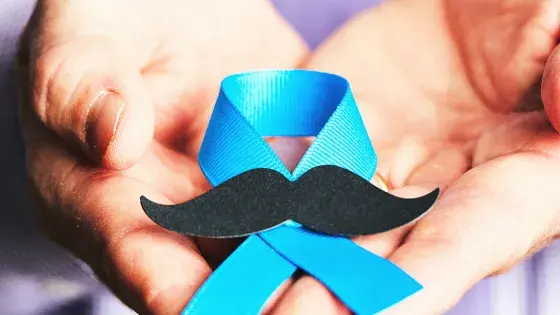Only 36% of referrals for NHS Talking Therapies are for men.
Suicide is the biggest killer of men under 50 in the UK – Three out of four deaths by suicide in the UK are men. In 2020 ten men died every day from suicide and most of these could have been prevented.
The statistics are terrifying, and one cannot help but ask ‘is there more that can be done?’ How does someone get to a place where suicide feels like the best option? Like the only option? These are our brothers, fathers, sons, partners, uncles, colleagues, friends – the men in our lives. We need to create an environment where men are comfortable opening up about the things that they are finding tough instead of keeping it all inside and bearing the burden alone.
Movember has grown to become a well-known global campaign and a symbol of positive approaches to men’s mental health concerns. Its key message is that better conversations are invaluable in recognising when a friend or loved one might be struggling with their mental health. However, starting a conversation isn’t always easy.
So how can we all help make talking more accessible and simpler for men?
- Meeting men where they are
Bringing care to men in locations, formats and messages that feel familiar and in line with how they tend to communicate is a key element in increasing accessibility, since it can help create an environment that is conducive to deeper conversations. Pubs, sport clubs, gyms, building sites – the places where men naturally are – can constitute settings where men feel more comfortable to open up. - Pairing talking with other tasks
It can be easier for men to approach a difficult topic whist they are also engaged in a parallel task, as this gives them the option to shift the focus of attention to a different activity if things get too intense for them. This can take the pressure off the conversation and allow them to pace themselves and be in control of how much they want to share. Planning enjoyable activities such as sports, hiking, going fishing, watching a game or a film can create a more casual environment and remove the barriers to opening up for men. - Shoulder to shoulder
Sitting or standing side by side can make a man more comfortable to approach a difficult conversation; looking ahead rather than being sat face to face tends to feel less confrontational for men, especially when they are feeling vulnerable; not having the intensity of direct eye contact can break down barriers and allow mean to be more relaxed and more open. - Change your language
A lot of the existing stigma around mental illness shows up in the language people use when approaching difficult conversations about well-being. Men can be negatively triggered by language that creates a sense of vulnerability, shame, or weakness. Try to adapt your language so it becomes more action oriented and empowering and reframes their struggles in a more positive light. Using phrases like ‘getting things back on track’ or ‘tackling problems’ taps into the problem-solving mindset that many men tend to feel more comfortable and familiar with, rendering them with a sense of control and containment.
Other ways of encouraging men to talk
Making sure that we engage in conversation and support the men in our lives can be really powerful.
Other ways in which we can turn mental health awareness into mental health action is by signposting men to other existing mental health related platforms for men that focus on encouraging men to talk.
Mental health campaigner and film maker Ben Akers is the co-founder of Talk Club, a movement that aims to help men talk about mental health difficulties and keep them mentally fit. Talk Clubs are centred around the basic principle that talking regularly about how you feel can keep you mentally fit, and hopefully prevent men becoming ill.
The question that is at the core of the campaign is: “How are you? Out of 10?”; once this is answered, one can further ask the person they are concerned about to explain their number. According to Akers, the very act of rating oneself on a scale to 10 is way of owning one’s mental/emotional state, which allows men to engage in a conversation and start to consider what tangible actions they can take to rise their number and become more mentally fit. If you’d like to know more about what TalkClub is and/or how to join please visit Home – Talk Club.
Another useful tool that you can use to engage in a difficult conversation if you are worries about a loved one is Movember Conversations, a free interactive online tool thar offers practical guidance on how to be a good listener and how to create an environment of trust and openness with someone who might be struggling. Based on the ALEC framework (Ask, Listen, Encourage action, Check in) and developed by mental health experts, the tool uses simulated conversations to explore and practise how you might navigate a difficult conversation with someone you are concerned about.
Whist the above suggestions and ideas can help you have more effective conversations and encourage the men in your life to open up more, the one single crucial thing that we can do is reach out and offer a friendly ear and be there for the man/men who you are concerned about – that alone can make a world of difference to how they are feeling.
Written by Dr Oana Barnett, Counselling Psychologist for Psych Health, a Health Partners company.
Please note: ‘Men’ in the context of our article may include men, trans women, people who are non-binary who were assigned male at birth and cis gender men; and ‘women’ may include women, trans men, people who are non-binary who were assigned female at birth and cis gender women.
References:
- Middle-aged men and suicide | Our policy and research | Samaritans
- Understanding Suicide Among Men (verywellmind.com)
- Suicide Advice & Support for Automotive Industry Workers | Ben
- Why more men than women die by suicide - BBC Future
- Men urged to talk about mental health to prevent suicide - GOV.UK (www.gov.uk)

